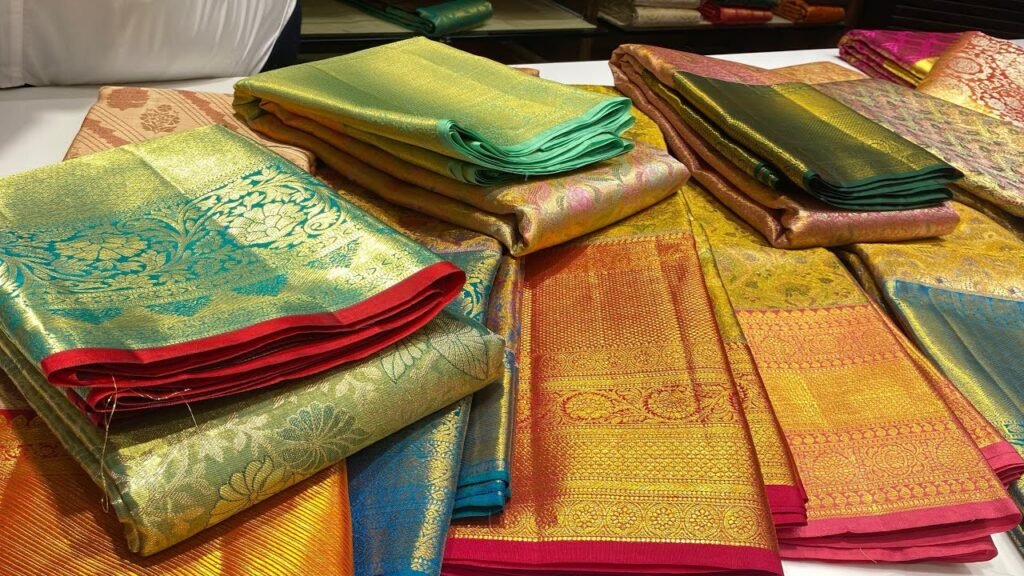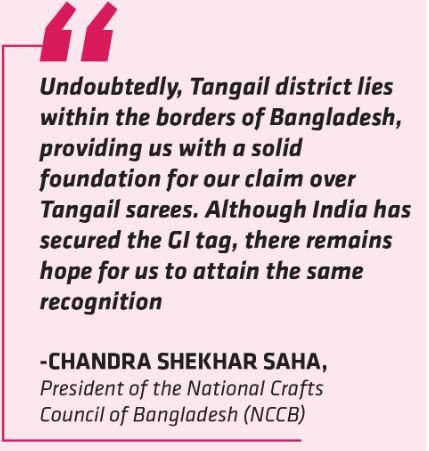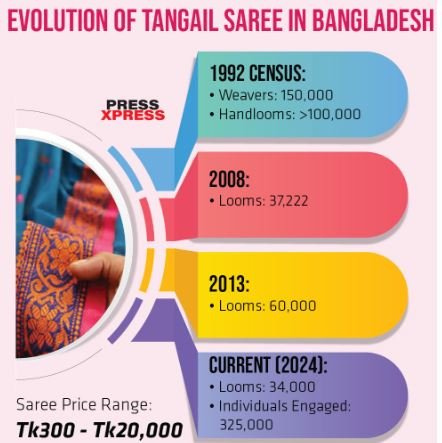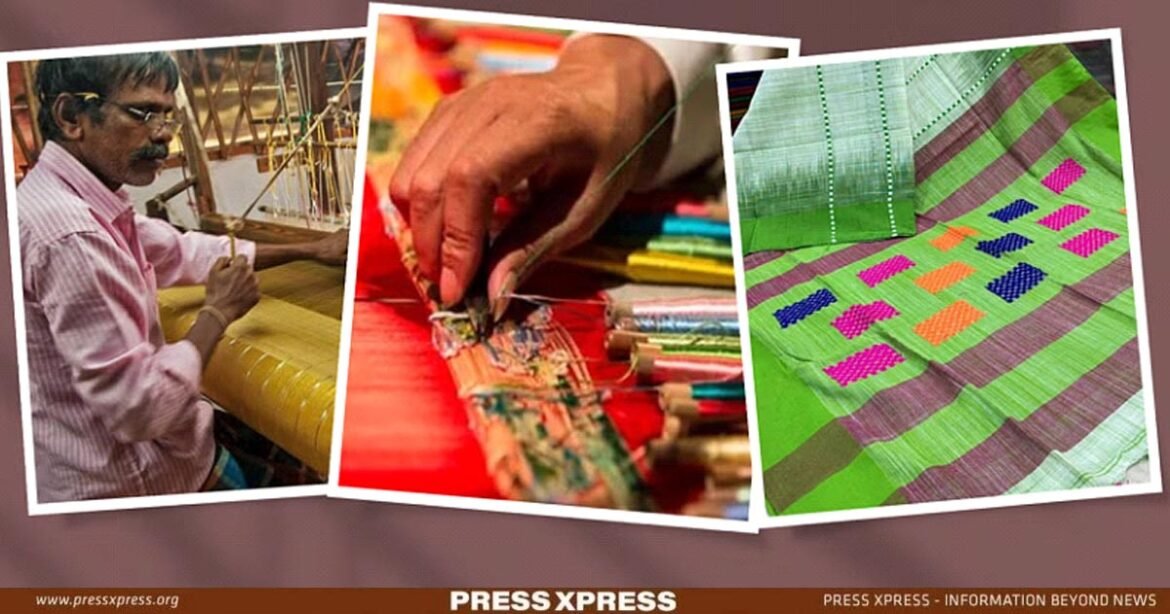Key Highlights:
- In Tangail, a group of citizens protested the Geographical Indication tag India has for the handloom sarees native to this region of Bangladesh
- After the 1971 Liberation War, many weavers from Tangail migrated to India, forming communities in West Bengal
- Currently, there are around 34,000 looms in Bangladesh
The handwoven Tangail saree from the Tangail district of Bangladesh has been a part of Bangladesh’s cultural heritage for ages. But West Bengal has been awarded the geographical indication (GI) tag for Tangail sarees, stirring up a lot of concern and controversy.
Based on an application by the Kolkata-based West Bengal State Handloom Weavers Co-Operative Society Limited, the Indian Geographical Indications Registry website registered the Tangail saree of Bengal on January 2, 2024. The application was lodged on September 8, 2020, and the registration will remain in effect until September 7, 2030.
The Indian Ministry of Culture wrote on Facebook on February 1, 2024, that the Tangail saree was a traditional creation of West Bengal. This claim ignited a controversy, as it contradicted the long-standing association of the saree with Bangladesh. Mamata Banerjee, the Chief Minister of West Bengal, also applauded the weavers on X (the renamed Twitter).
This is not a new controversy for the Tangail saree’s identity. An earlier commercial at the Kolkata airport caused a conflict over the saree’s origin, saying it was handwoven in Phulia, Nadia district, West Bengal.
A group of citizens rallied in Tangail on Saturday against the Geographical Indication tag that India has for the handloom sarees that are native to this central region of Bangladesh. The demonstrators carried placards and called for the government to intervene urgently to secure the GI status of Tangail sarees, a matter of national cultural heritage.
What is GI certification?
When the local culture of a specific region in a country significantly influences the production of a particular product based on its land, water, and weather conditions, it earns recognition as a Geographical Indication (GI) product within that country.
The World Intellectual Property Organization (WIPO) upholds regulations and issues certifications and patents through the government’s design, patent, and trademark office.
Products bearing GI certification stand apart from similar ones in other countries, establishing distinct marketability. Consequently, this uniqueness enhances the product’s acceptance, potentially leading to price increases of up to 20-30 percent.
A Cultural Heritage of Bangladesh in Peril

Tangail saree, named after the district where it is made, has a rich history that goes back to the late 1800s. 22-23 villages in Tangail, including Pathrail, Nalashodha, and Gharinda, collectively known as Bishgram notably emerged as the origins of this saree.
The Basak community, known as Hindu weavers, were the first to weave Tangail sarees. They were originally muslin weavers from Dhamrai and Chauhatta in the current Dhaka district, who migrated to Tangail in the 19th century due to the lack of muslin and the need for a better climate.
The weaving industry flourished during the Swadeshi movement led by Mahatma Gandhi in 1906, when patterns were added to the plain fabrics. In 1931-32, Jacquard looms were used for saree making.
Tangail weaving, with its distinctive features, became globally acclaimed. Expert weavers, mainly from the Basak community in the Patil Union of the district, still make sarees in the authentic and traditional manner. These sarees are available at Bajitpur and Kartia Haats twice a week.
However, the assertion that the Tangail saree represents India’s cultural heritage has political origins.

Political Palette of West Bengal’s Tangail Saree Claim
Following the 1971 Liberation War, numerous weavers from Tangail migrated to India, establishing communities in West Bengal’s Nabadwip, Phuliya, Samudragarh, Srirampur, and Nasratpur regions. They played a pivotal role in imparting the art of saree weaving to the Indian populace.
Presently, Tangail sarees encounter hurdles in India. The authentic Tangail saree has witnessed a depreciation in its worth due to the widespread availability of polyester-based sarees and machine-produced weaves.Renowned for their finer thread count and elaborate patterns, the immensely popular Tangail cotton sarees from Bangladesh feature additional warp designs using colored yarn.
They represent a simplified variant of the Jamdani cotton saree, characterized by minimalistic designs across the body section. Bangladeshi Tangail weave sarees have garnered international acclaim.However, a new development arises as the geographical indication (GI) patent for the Tangail saree has been secured by West Bengal at the international level.
Consequently, entrepreneurs in West Bengal are striving to position the Tangail saree as their unique and valuable commodity.
The Everlasting Allure of Tangail Sarees in Bangladesh

The weavers suffered greatly from the lockdowns during the Covid-19 pandemic in 2020-21, but many of them compensated for the losses by expanding their businesses beyond the border. Foreign orders are now bringing wholesalers and suppliers to Tangail, while retail sellers and customers also choose to buy sarees directly from the Tantpallis.
As per the 1992 census, the district had 150,000 weavers and more than 100,000 handlooms. The number of looms decreased to 37,222 in 2008, but increased to 60,000 in 2013. Currently, there are around 34,000 looms.
In the current situation, about 325,000 individuals, including weavers, owners, and trader-buyers, are actively engaged in this profession in the district. The sarees they make are priced between Tk300 and Tk20,000.
Wholesale buyers from different parts of the country are buying sarees from the traders. The Tangail loom sarees are also being shipped to various countries like India, the USA, the UK, Italy, and Saudi Arabia.
The debate over the GI tag emphasizes the criticality of acknowledging and safeguarding cultural heritage, especially amidst commercial pressures and geopolitical shifts.The hardships endured by Tangail weavers, aggravated by hurdles like the COVID-19 pandemic, stress the importance of offering support and recognition for their craftsmanship on both domestic and international fronts.


